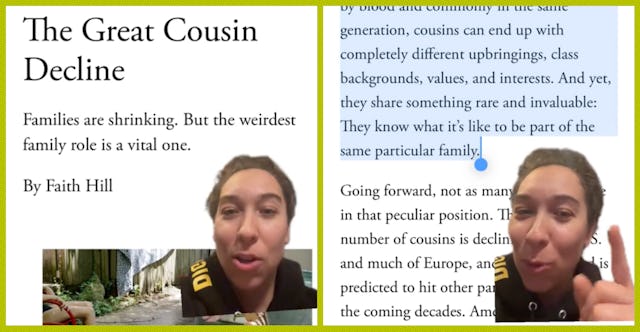This Viral TikTok Breaks Down Why The “Great Cousin Decline” Is Problematic
A recent article in The Atlantic revealed these types of family members are dropping dramatically in number.

For many people, cousins are first friends. The ones who, as you grow up, you can always count on to lock eyes with across the table at holiday dinners when your uncle starts spiraling about politics. For some of us, they're practically siblings. So, when The Atlantic published an article last month revealing that cousins are declining, the internet had ~feelings.~
"Do we just not need cousins? What this article is basically saying is, in fact, we do," explains TikToker Miriam Tinny, breaking down the report from The Atlantic. "Cousins fill this really particular void in our family tree and in our lives, because while they might have totally different upbringings, class, backgrounds, values, and interests, they share something rare — which is that they know what it's like to be a part of your family."
But as The Atlantic flagged, the average number of cousins is declining in the United States and much of Europe.
As Tinny explains, "American families are shrinking. People are having fewer children, which means that there are fewer cousins around."
In recent history, it wasn't uncommon for a family to have four to six kids and for each of those kids to go off and have their own large family, which meant tons of cousins. However, Gen X, Millennials, and even Gen Z adults are choosing to have smaller families or forgo having kids at all.
With smaller families, there's less chance for cousins, and as weird as it might sound, that might be a problem.
"They say that American family trees are turning into beanstalks — tall and narrow," says Tinny. "So, people are more likely to have multiple generations of relatives alive at the same time but fewer lateral relationships like cousins and siblings because of the fertility rate."
In other words, families are growing up instead of out. Not only are there fewer cousins, but research also suggests that only 6% of adult cousins live in the same census tract (typically a neighborhood or zip code). Most cousins today live an average of 237 miles apart.
This is obviously a significant change from how close cousins lived just a few generations ago. If you have a boomer parent, they probably have stories of going to school with their cousins, and many cousins from the Silent Generation lived in the same home or on the same plot of land.
We're spreading farther apart physically, but what does that mean for our emotional well-being? The loss of cousins, it turns out, is a big one.
Cousins are often our first real exposure to people in different socio-economic classes with different religions or values, cites The Atlantic. Cousins come with less responsibility and obligation, like financial support during hard times. Older cousins may act as big sisters or brothers, offering support systems to younger cousins who may not have that system within their nuclear family.
Basically, while cousins make good role models and offer unique bonding experiences, they don't hold the expectations you find between siblings or children and parents or grandparents.
"Because we don't rely on cousins for material help, they might actually be able to provide more emotional help without strings attached," explains Tinny of findings that suggested many people became closer to their cousins during COVID in 2020.
So, given all of this, it's no surprise the internet has a lot of thoughts on The Great Cousin Decline.
"Without cousins, who will my kids go smoke with on the cousin walk at Thanksgiving?" joked one commenter on Tinny's now-viral video.
"As an only child, cousins are VITAL," said another. "I need someone to be family to my kids.”
While one commenter added, "It's so interesting bc how close you are to your cousins is 100% determined by your parents and the effort they put into keeping in touch/travel," several people suggested that placing all the blame on your own parents might not be fair — some families are just toxic.
Several commenters noted that in BIPOC families, cousins remain an integral relationship.
And one person pointed out an arguably crucial role of cousins: "They say cousins are often the first 'best friend' relationship."
It seems that whether cousins are ride-or-dies or first tormentors (*raises hand*), they hold a special place in people's lives — albeit a place that is diminishing with time and the changing fabric of families.